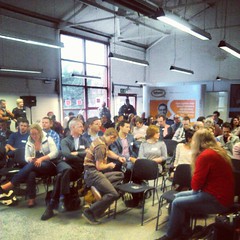One of Harrison Owen’s principles for Open Space (on which most unconferences are based) is “Whoever comes is the right people”. It’s there to remind us that we don’t need the boss or experts to have a useful conversation, we just need people who care enough to show up.
I’ve found that one of my jobs as a facilitator is to remind people that the event is about the people in the room, not those who couldn’t or wouldn’t make it. The draw to give power away to people outside the room is strong, it’s expected in lots of meetings where we’re essentially delegates for the rest of our team or organisation.
Here are 5 ways in which I’ve seen us (me included) do that:
1. Working on the agenda beforehand
Open Space and unconferences start with no initial agenda, just a purpose, a common interest that we want to talk about and a bunch of people who have something to contribute. It’s tempting to make the day “more efficient” by having lots of conversations online setting out your stall for what you want to talk about, getting feedback, but it inadvertently gives power to people who aren’t in the room. It sets an expectation, at least for those who have a look at this “prep work” that these are the things we’ll talk about. It leaves the door open to people who want to influence the agenda without committing to a day in the room, because we tend to fall in with what’s already there. If I come late to the online conversation, especially if I’m not terribly au fait with the subject area, I will look to see what norms have been established about subjects so that I can fit in well. I don’t want to propose something that has people looking at me in a funny way.
It also gives disproportionate power to those who have, for whatever reason, more time to spend on preparation in the run up to the event than others do. I think it probably also affects the number of people who show up ready to be “spectators”. I can see that there are plenty of clever people with a much stronger grasp of the subject than I so I think I’ll just keep my silly little idea to myself.
2. Trying to represent your team’s wishes
They’re not here. You are. You’re one of the right people to be here. They’re not (because they’re not here!) Stop worrying about what so-and-so would say if they were here and say what you want to say. This goes too for paying too much attention to people who manage large departments or organisations. The fact that they lead programmes employing hundreds of people costing millions of pounds doesn’t mean that they know any more about the problem in hand than you do. They may well know less.
3. Going to sessions because “you should”
I know. It’s really hard. There are 10 sessions all going on at once and you want to go to three of them but you ought to go to one of the others and stay there because it’s directly related to your job – what will your manager say if she sees that this was on the agenda and you didn’t go? I think the best way to deal with this is to remember, for today, that your job is to learn and to contribute. Pop into the “should” session to see whether you missed anything but otherwise, keep using the law of two feet to find the places where you can best learn and/or contribute.
4. Letting technology get in the way
It’s great to have an audio or video record of a session. It’s really cool to have a live-stream so that people who couldn’t make it can watch along in real-time. It’s really useful to the whole community if people can live-tweet and live-blog sessions. But. All of these things have the possibility of becoming more important than the conversation we’re actually having. Common adverse effects are people unconsciously censoring what they say because they know they’re being reported or recorded or people saying things deliberately to make sure that they are on record. The other difficulty arises when the interactivity of twitter and live-streaming take over. This can take the form of trolling from outside or something as apparently benign as people outside asking that people speak more clearly for them to hear on the stream.
5. Thinking too much about the future
In this case, the “people not in the room” are “future me” and/or “future other people”. I worry about what future me will think of what I’m saying. I worry that future me will be somehow disadvantaged because I say something stupid. And then I worry about what future other people will think when they get home and they reflect on the day and “oh my god what was that dickhead, Lloyd, saying???” They’re not here, they’re not real, they don’t get to decide what gets said in the room.
PS I generally don’t like writing list-based posts but today I’ve done two – my thinking may be becoming dangerously structured! 🙂


